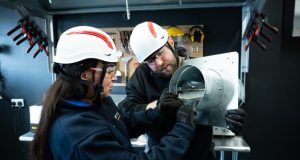 The Cleaning & Hygiene Suppliers Association (CHSA) is warning all buyers of cleaning and hygiene products to beware of unscrupulous profiteers capitalising on the unprecedented demand for these products.
The Cleaning & Hygiene Suppliers Association (CHSA) is warning all buyers of cleaning and hygiene products to beware of unscrupulous profiteers capitalising on the unprecedented demand for these products.
New companies have been set up to buy and sell on products like hand and surface sanitisers, gloves, wipes, tissue and aprons. Some are also buying up raw materials and attempting to produce some products. Primarily selling online, their products carry an exceptionally high mark-up and there is no guarantee they meet industry standards. There is also a marked increase in imported Personal Protective Equipment (PPE) with fake or no CE marking, the certification mark that indicates conformance with European Union directives regarding health and safety or environmental protection.
The only way to be certain you get what you pay for is to buy from a CHSA member. All have signed the Association’s rigorous Code of Practice, which requires members to be “’well established’ in the cleaning and hygiene industry and to maintain a high standard in the conduct of its business.”
The CHSA Accreditation Scheme stamp guarantees members of the Schemes for Distributors and Manufacturers of Soft Tissue, Plastic Refuse Sacks and Industrial Cotton Mops make sure ‘what’s in the box is what’s on the box.’
Compliance to the CHSA’s Accreditation Schemes and Code of Practice is guaranteed by a rigorous auditing process conducted by an independent inspector.
To be certain they purchase from reputable companies in these turbulent times, buyers of cleaning and hygiene products should look for the CHSA logo and CHSA Accreditation Scheme stamp.
Lorcan Mekitarian, Chair of the CHSA said: “A 10-fold increase in demand for essential products like hand sanitiser, wipes and gloves is common.
“Our manufacturing members are working hard to meet demand and keep product moving through the supply chain to our distributor members, but it is incredibly challenging.
“Some price increases are inevitable as the cost of raw materials rises but this is a long way from the extraordinary profiteering we have seen.
“I am proud to say our members are trading ethically. Instead of grabbing contracts at extortionate prices from desperate buyers, they are working hard to take care of their existing customers, warning of forthcoming restrictions in the supply chain and rationing where absolutely necessary.”
Demand for cleaning products like wipes, cleaning chemicals and clinical waste sacks, and for personal protective equipment including gloves and aprons has soared. The diversion of available product to the NHS created a sharp decline in product in the standard supply chain, making it difficult for care homes, schools, businesses and other organisations to get what they need. With these products central to creating a safe environment into which people can return to work, demand will remain exceptional for the foreseeable future.




